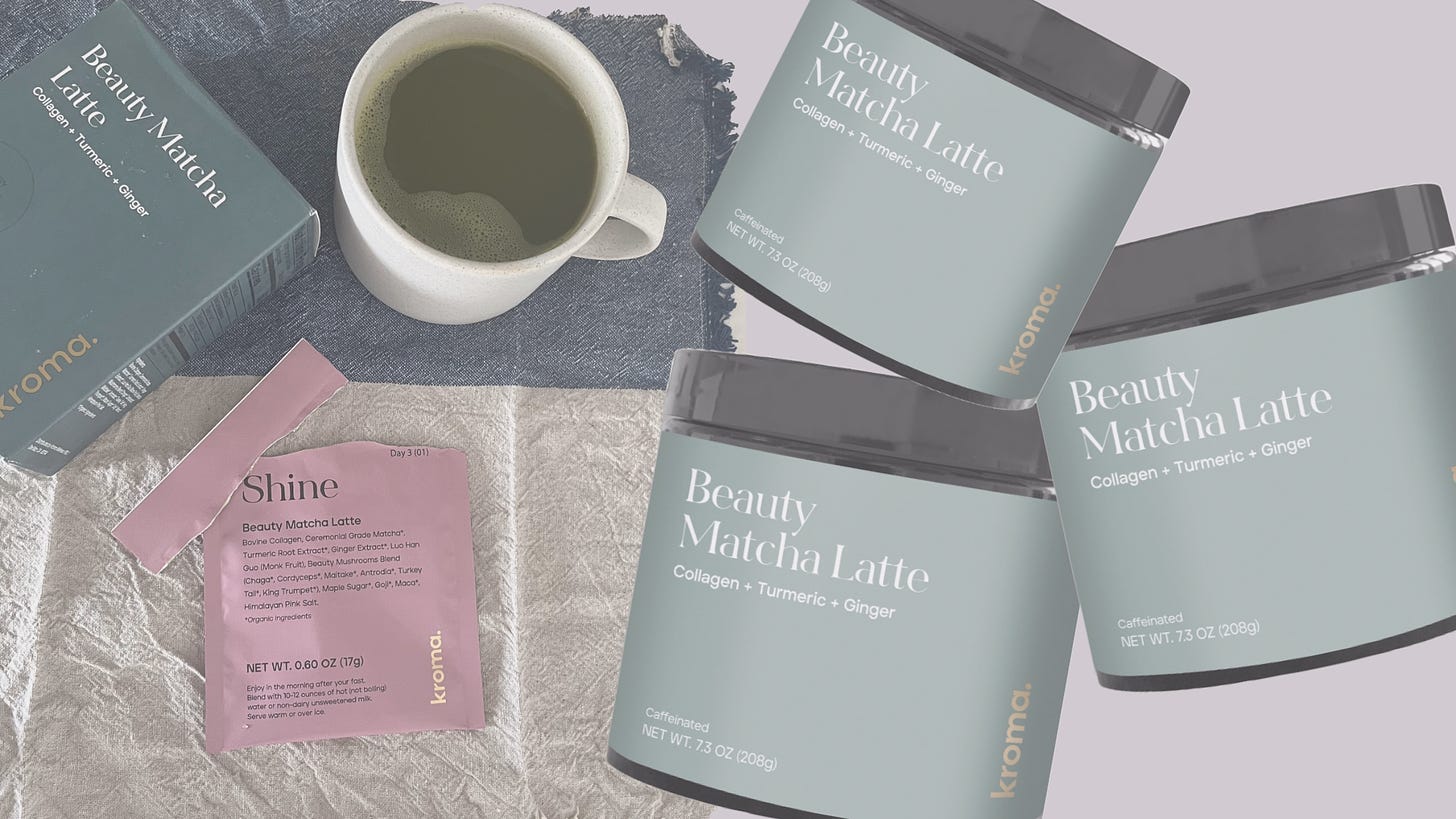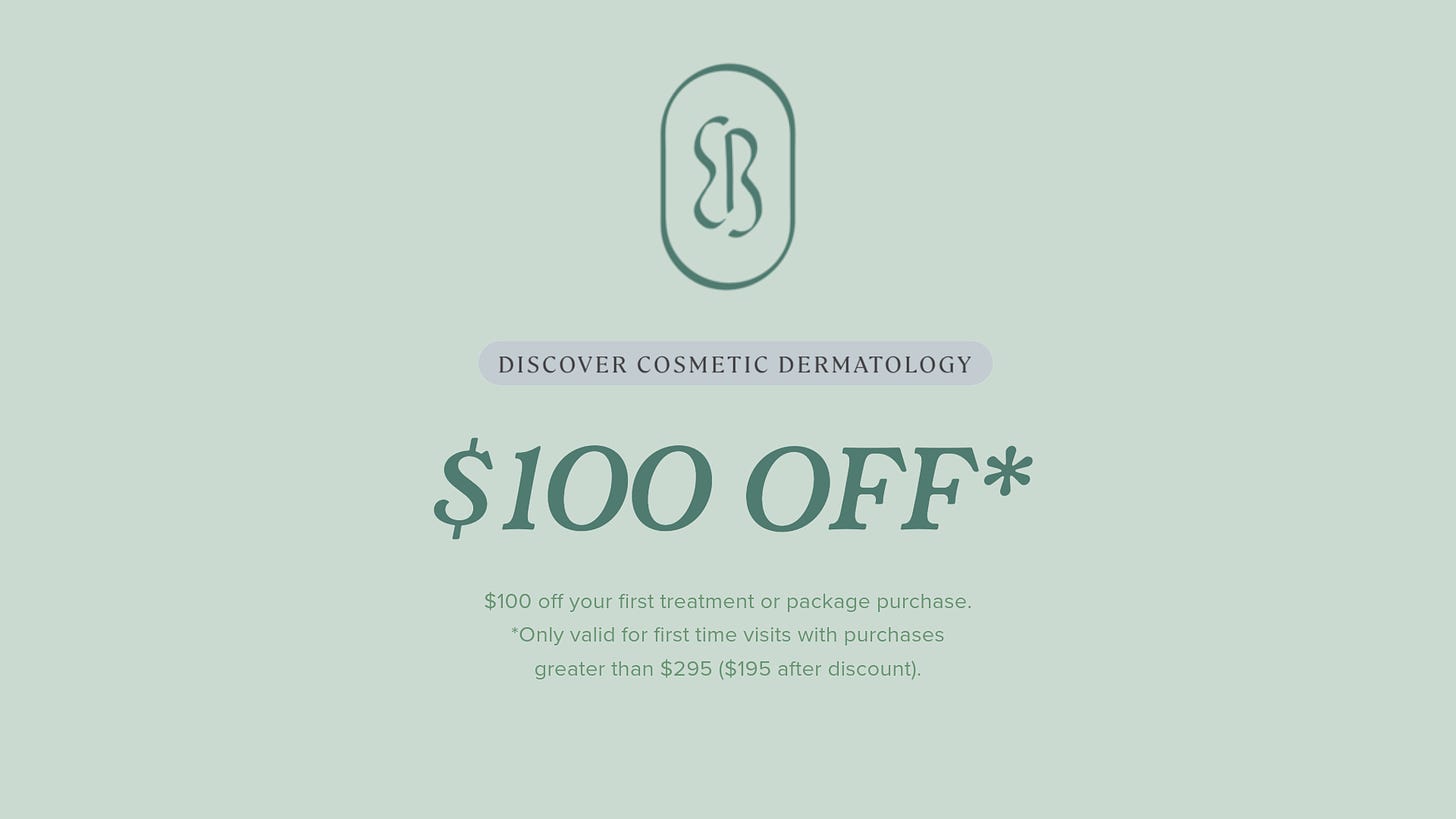05. Collagen Conundrum. Do Supplements Work?
POV: You’ve just discovered the anti-filler filler that Ryan Gosling wishes he had.
In the ever-evolving world of beauty and wellness, collagen has become a buzzword, often touted as the secret to youthful, glowing skin. But what exactly is collagen, and how does it function within our bodies? More importantly, can the myriad of collagen supplements on the market truly make a difference in our skin's appearance? Let’s delve into the science behind collagen, its role in our skin, the efficacy of collagen supplements, and the nonevasive procedures claimed to boost its production.
The Science Behind Collagen
Collagen is the most abundant protein in our bodies, comprising about one-third of our total protein content. It is a major component of connective tissues, including skin, tendons, ligaments, and muscles. There are at least 16 types of collagen, but 80-90% of the collagen in our bodies consists of types I, found in skin and bone; II, found in cartilage; and III, found in the muscle.
In the skin, collagen provides structure and elasticity, making it essential for maintaining a youthfully plump and firm appearance. Collagen fibers form a mesh-like network that supports the skin’s structure, keeping it plump and resilient. This network works in tandem with another protein called elastin, which gives skin its ability to snap back after stretching.
Aging and Collagen Depletion
As we age, our bodies naturally produce less collagen, and the quality of the collagen we do produce diminishes. This decrease typically begins in our mid-20s and accelerates in our 30s and 40s. Several factors contribute to this decline, including the natural aging process, which leads to the gradual loss of collagen and elastin, resulting in thinner, less elastic skin. Environmental factors such as UV radiation, pollution, and lifestyle choices also accelerate collagen breakdown. This reduction in collagen leads to common signs of aging, such as wrinkles, sagging skin, and a loss of firmness and elasticity.
Supplementing Collagen: Does It Really Work?
Collagen supplements, especially powders, have surged in popularity. These supplements are usually hydrolyzed, meaning the collagen is broken down into smaller peptides for easier absorption by the body. But the key question remains: Do these supplements work, and can they actually improve skin health?
Insights from Misato Yazaki's Research
Dr. Kay on TikTok introduced me to the research and led me down the most insightful rabbit hole, which, ultimately, was Misato Yazaki’s research papers. Misato Yazaki, a researcher in the field of collagen, has provided substantial insights into the efficacy of collagen supplements and their impact on skin health. Yazaki's studies have focused on the bioavailability of collagen peptides and their ability to improve skin properties.
1. Bioavailability and Mechanism of Action
Yazaki's research has demonstrated that hydrolyzed collagen peptides are indeed bioavailable, meaning they can be effectively absorbed into the bloodstream. Once absorbed, these peptides accumulate in the skin and stimulate the production of new collagen fibers. This is achieved by activating fibroblasts, the cells responsible for synthesizing collagen and other extracellular matrix components.
2. Clinical Benefits
In a study conducted by Yazaki and colleagues, participants who consumed collagen peptides showed a significant improvement in skin elasticity, hydration, and density. The study highlighted that regular intake of collagen supplements could lead to visible improvements in skin appearance, particularly in reducing wrinkles and fine lines.
3. Synergistic Effects with Other Nutrients
Yazaki's literature also emphasizes the importance of a holistic approach to collagen supplementation. Combining collagen peptides with other nutrients such as vitamin C, hyaluronic acid, and antioxidants can enhance the overall effectiveness of the supplements. Vitamin C, for instance, is crucial for collagen synthesis and helps protect existing collagen fibers from oxidative damage.
4. Long-term Benefits
Yazaki's long-term studies suggest that continuous intake of collagen peptides can lead to sustained improvements in skin health. Participants who consumed collagen supplements for over six months reported better skin elasticity and hydration, reduced joint pain, and improved overall wellness.
While collagen supplements can contribute to better skin health, it’s not a cure-all on its own. You still need a balanced diet rich in vitamins and minerals such as vitamin C, which is essential for collagen synthesis, to drink enough water, get regular exercise, and, ahem, use your sunscreen.
 Tiktok failed to load.
Tiktok failed to load.Enable 3rd party cookies or use another browser
The Protocol
✨ Insert new partnership announcement here✨
I am so excited to announce that I am a new Kroma partner. Of course, I secured an exclusive discount for the Well Theorem family.
At www.kromawellness.com, use code WELLTHEOREM15 at checkout to receive 15% off your first purchase of Kroma Lifestyle Resets and Daily Essentials.
Why Kroma? Because on my quest to find the perfect collagen supplement to add to my morning routine, I fell in love with their “Green Magic” Beauty Matcha Latte. Made with antioxidant-rich ceremonial-grade matcha, it contains just enough caffeine and naturally occurring L-theanine for energy and focus without turning me into a jittery mess. And for the star ingredient, it’s enhanced with premium bovine collagen to help strengthen hair, skin and nails, along with immune and energy-boosting superfoods like Turmeric, Goji, Maca, and Ginger.
I mentioned in last week’s post that I love a morning ritual. There’s something about using a frother and recreating a drink that would easily cost $12 to $15 at a corner barista coffee shop, but instead, you’re at home still in a robe, watching the sunrise. I tested Beauty Matcha out for a week before fully committing, and it passed the vibe check. If you’re not typically a fan of matcha tea, I have a feeling you’ll be pleasantly surprised. This one isn’t as earthy as pure matcha and has a mellow, nutty flavor from the turmeric and a spice-forward warmness from the ginger. I have been on a pistachio kick lately, and mixing this with Elmhurst Pistachio Cream Oat Creamer is, mwah, chef’s kiss.
Five years ago, I switched from my beloved morning coffee to Matcha and immediately felt the difference. I no longer had the jitters from coffee, let alone the irritability, anxiousness, and mid-morning crash. My mind was clear and my mood improved immediately. Beauty Matcha Latte is my ultimate morning ritual and treat. It tastes like heaven and it works wonders on my energy and skin. It’s Green Magic.
-Lisa O., founder of Kroma
One Step Further–Getting Under the Skin
I enjoy the one-two punch of incorporating elevated facials and non-invasive treatments into a routine and protocol. My preference is to enhance, not alter. And Sculptra and PRP are two enhancing treatments that really stand out for boosting collagen production.
Sculptra: Gradual Collagen Builder for Lasting Volume
Sculptra stands out as a unique approach to skin rejuvenation by gradually stimulating the body's natural collagen production. Unlike traditional dermal fillers that provide immediate volume by directly filling wrinkles and lines, Sculptra’s poly-L-lactic acid (PLLA) microparticles work beneath the skin to encourage collagen synthesis over time. When injected, these microparticles act as a scaffold, supporting the growth of new collagen strands and enhancing the skin's structural integrity. This process results in a more natural-looking restoration of facial volume and firmness. The gradual nature of collagen synthesis means that results develop subtly, avoiding the “overfilled” look that seems to be spreading throughout Hollywood like a bad case of mono. It also provides long-lasting results lasting up to two years or more.
PRP: Harnessing Your Body's Healing Power for Collagen Renewal
Platelet-rich plasma (PRP) therapy offers a natural and innovative way to boost collagen production by utilizing your own blood. In PRP treatment, a small amount of blood is drawn and processed to concentrate the platelets, which are rich in growth factors. These growth factors play a critical role in tissue repair and regeneration. When injected into the skin, PRP stimulates the body’s natural healing processes, encouraging the formation of new collagen and elastin fibers. This leads to improvements in skin texture and elasticity. PRP is particularly beneficial for addressing fine lines, wrinkles, and acne scars, and it is often celebrated for its minimal risk of allergic reactions since it uses the patient’s own biological material.
🪩 More deals on deals 🪩
Interested in exploring the benefits of Sculptra or PRP? Ever/Body is the ideal destination. Renowned for its expertise in advanced aesthetic treatments, Ever/Body offers a personalized approach to collagen enhancement, ensuring each treatment is tailored to meet your unique skin goals. Their team of skilled professionals combines state-of-the-art technology with a deep understanding of the latest in aesthetic medicine.
And as a subscriber, you get $100 off your first treatment or package purchase.
📌 Final Thoughts
Collagen is undeniably a fundamental protein for maintaining skin resilience. As we have the beautiful privilege of aging, the decline in collagen production is inevitable. Collagen supplements, particularly hydrolyzed collagen peptides, have shown promise in supporting skin health by potentially boosting the body’s collagen levels and improving skin elasticity and hydration.
However, it is important to remember that no single supplement can replace a healthy lifestyle. For optimal skin health, combine collagen intake with a nutritious diet and proper skin care. By adopting a comprehensive approach, you can support your skin’s natural structure and maintain a voluminous glow.
Keep it peachy. Stay radiant!
Until Next Time,
T.







